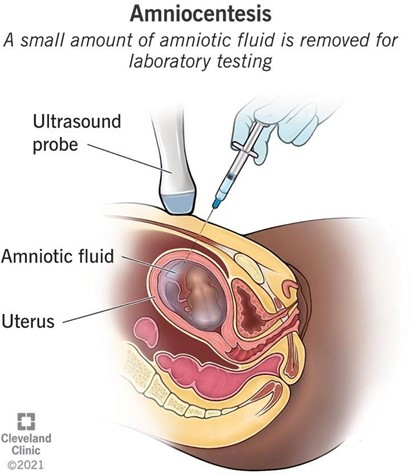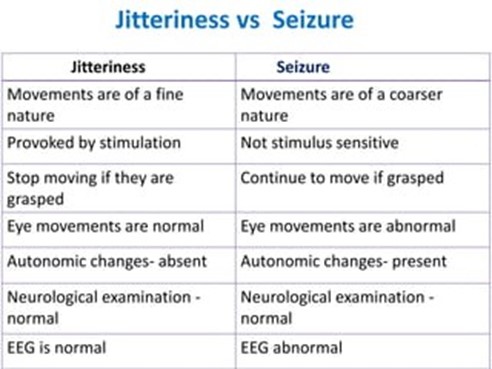A charge nurse is teaching a newly licensed nurse about Rho(D) immune globulin administration. Which of the following should the charge nurse include as an indication for the administration of Rho(D) immune globulin?
Hyperemesis gravidarum
Rh-positive blood test results
Prescription for an amniocentesis
Anemia
The Correct Answer is C
This is because a prescription for an amniocentesis is an indication for the administration of Rho(D) immune globulin (RhIG) to prevent RhD isoimmunization in mothers who are RhD negative¹². RhD isoimmunization is a condition where the mother's immune system produces antibodies against the RhD antigen on the baby's red blood cells, which can cause hemolytic disease of the newborn (HDN)¹². RhIG is a medication that contains antibodies against the RhD antigen, and it works by binding to and destroying any fetal red blood cells that may enter the maternal circulation, preventing the mother from making her own antibodies¹²³. RhIG is usually given to RhD negative mothers during pregnancy and after delivery if the baby is RhD positive¹².
Amniocentesis is a procedure where a needle is inserted into the uterus to obtain a sample of amniotic fluid, which contains fetal cells and other substances⁴. Amniocentesis can be done for various reasons, such as genetic testing, fetal lung maturity assessment, or infection diagnosis⁴. However, amniocentesis also carries a risk of causing bleeding or leakage of amniotic fluid, which can result in fetal-maternal hemorrhage (FMH), where fetal blood cells enter the maternal circulation⁴⁵. FMH can trigger RhD isoimmunization in RhD negative mothers, so they should receive RhIG within 72 hours of the procedure to prevent this complication⁵.
The other options are not correct because:
a) Hyperemesis gravidarum is not an indication for RhIG administration. Hyperemesis gravidarum is a condition where the mother experiences severe nausea and vomiting during pregnancy, which can cause dehydration, electrolyte imbalance, and weight loss. Hyperemesis gravidarum does not affect the blood type or compatibility of the mother and the baby, and does not increase the risk of RhD isoimmunization or HDN.
b) Rh-positive blood test results are not an indication for RhIG administration. Rh-positive blood test results mean that the mother has the RhD antigen on her red blood cells, and therefore she cannot develop antibodies against it¹². Rh-positive mothers do not need RhIG, as they are not at risk of RhD isoimmunization or HDN¹².
d) Anemia is not an indication for RhIG administration. Anemia is a condition where the mother has a low level of hemoglobin or red blood cells, which can cause fatigue, weakness, and shortness of breath. Anemia can have various causes, such as iron deficiency, bleeding, or infection. Anemia does not affect the blood type or compatibility of the mother and the baby, and does not increase the risk of RhD isoimmunization or HDN.

Nursing Test Bank
Naxlex Comprehensive Predictor Exams
Related Questions
Correct Answer is C
Explanation
This is because a prescription for an amniocentesis is an indication for the administration of Rho(D) immune globulin (RhIG) to prevent RhD isoimmunization in mothers who are RhD negative¹². RhD isoimmunization is a condition where the mother's immune system produces antibodies against the RhD antigen on the baby's red blood cells, which can cause hemolytic disease of the newborn (HDN)¹². RhIG is a medication that contains antibodies against the RhD antigen, and it works by binding to and destroying any fetal red blood cells that may enter the maternal circulation, preventing the mother from making her own antibodies¹²³. RhIG is usually given to RhD negative mothers during pregnancy and after delivery if the baby is RhD positive¹².
Amniocentesis is a procedure where a needle is inserted into the uterus to obtain a sample of amniotic fluid, which contains fetal cells and other substances⁴. Amniocentesis can be done for various reasons, such as genetic testing, fetal lung maturity assessment, or infection diagnosis⁴. However, amniocentesis also carries a risk of causing bleeding or leakage of amniotic fluid, which can result in fetal-maternal hemorrhage (FMH), where fetal blood cells enter the maternal circulation⁴⁵. FMH can trigger RhD isoimmunization in RhD negative mothers, so they should receive RhIG within 72 hours of the procedure to prevent this complication⁵.
The other options are not correct because:
a) Hyperemesis gravidarum is not an indication for RhIG administration. Hyperemesis gravidarum is a condition where the mother experiences severe nausea and vomiting during pregnancy, which can cause dehydration, electrolyte imbalance, and weight loss. Hyperemesis gravidarum does not affect the blood type or compatibility of the mother and the baby, and does not increase the risk of RhD isoimmunization or HDN.
b) Rh-positive blood test results are not an indication for RhIG administration. Rh-positive blood test results mean that the mother has the RhD antigen on her red blood cells, and therefore she cannot develop antibodies against it¹². Rh-positive mothers do not need RhIG, as they are not at risk of RhD isoimmunization or HDN¹².
d) Anemia is not an indication for RhIG administration. Anemia is a condition where the mother has a low level of hemoglobin or red blood cells, which can cause fatigue, weakness, and shortness of breath. Anemia can have various causes, such as iron deficiency, bleeding, or infection. Anemia does not affect the blood type or compatibility of the mother and the baby, and does not increase the risk of RhD isoimmunization or HDN.

Correct Answer is C
Explanation
Hypoglycemia is a condition in which the blood sugar (glucose) level is too low. Glucose is the main source
of energy for the brain and the body. Newborns need a steady supply of glucose to maintain normal body
functions and growth. Hypoglycemia can occur in newborns for various reasons, such as prematurity, infection, birth asphyxia, maternal diabetes, or inadequate feeding¹.
Hypoglycemia can cause various symptoms in newborns, depending on the severity and duration of the low blood sugar level. Some of the common symptoms include:
- Jitteriness or tremors
- Irritability or crying
- Lethargy or sleepiness
- Poor feeding or sucking
- Low body temperature
- Pale or blue skin color
- Sweating
- Rapid breathing or heart rate
- Seizures or coma
Jitteriness is one of the earliest and most frequent signs of hypoglycemia in newborns². It is caused by the stimulation of the nervous system by low blood sugar levels. Jitteriness can be distinguished from seizures by several features, such as:
- Jitteriness is provoked by stimuli, such as noise or touch, while seizures occur spontaneously
- Jitteriness stops when the stimulus is removed or when the baby is held, while seizures persist
- Jitteriness involves rapid movements of the limbs, chin, or trunk, while seizures involve rhythmic jerking of
the limbs or eyes
- Jitteriness does not affect the level of consciousness, while seizures may cause the baby to be unresponsive
The other options are not typical signs of hypoglycemia in newborns and have different causes:
a) Petechiae are small red or purple spots on the skin caused by bleeding under the skin. They can occur due to trauma during delivery, infection, clotting disorders, or low platelet count.
b) Increased muscle tone is a state of increased tension or stiffness in the muscles. It can occur due to neurological disorders, such as cerebral palsy, spinal cord injury, or brain damage.
d) Abdominal distention is a condition in which the abdomen becomes swollen or enlarged. It can occur due to various causes, such as intestinal obstruction, gas accumulation, organ enlargement, fluid accumulation, or tumor.

Whether you are a student looking to ace your exams or a practicing nurse seeking to enhance your expertise , our nursing education contents will empower you with the confidence and competence to make a difference in the lives of patients and become a respected leader in the healthcare field.
Visit Naxlex, invest in your future and unlock endless possibilities with our unparalleled nursing education contents today
Report Wrong Answer on the Current Question
Do you disagree with the answer? If yes, what is your expected answer? Explain.
Kindly be descriptive with the issue you are facing.
